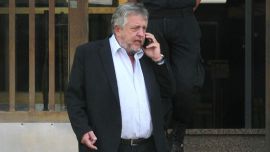Twitter on Monday confirmed it is selling the platform to billionaire entrepreneur Elon Musk in a deal valued at $44 billion.
The sale was a dramatic shift for the board, which had originally manoeuvred to block Musk from taking the social media network private.
"Free speech is the bedrock of a functioning democracy, and Twitter is the digital town square where matters vital to the future of humanity are debated," Musk said in a joint release announcing the takeover. “Twitter has tremendous potential – I look forward to working with the company and the community of users to unlock it.”
The deal, one of the biggest one of the biggest leveraged buyouts in history, will take the 16-year-old social networking platform that has become a hub of public discourse and a flashpoint in the debate over online free speech private.
Investors will receive US$54.20 for each Twitter share they own, the company said in a statement Monday. The price is 38 percent more than the stock’s close on April 1, the last business day before Musk disclosed a significant stake in the company, sparking a share rally. Twitter shares were halted for the news.
Twitter's shares had already risen Monday following reports the company is poised to accept Musk's takeover offer.
Musk, who had taken a major stake in the firm earlier this month before making a formal purchase offer, tweeted earlier on Monday: "I hope that even my worst critics remain on Twitter, because that is what free speech means," without elaborating.
The multi-billionaire last week lined up around US$46.5 billion in financing to make the purchase happen.
Representatives of Twitter and Musk worked through Sunday night to hammer out the deal, according to the reports.
Trump to return?
Musk, one of Twitter’s most prolific users with more than 83 million followers, launched his US$43 billion hostile takeover bid for the company, casting it as a promotion of freedom of speech.
While the firm's board initially said it was reviewing the offer, it later rebuffed him and adopted a "poison pill" plan that would make it harder for Musk to acquire a controlling stake.
That defence kicks in if an investor buys more than 15 percent in shares without the directors' agreement. Musk holds nine percent.
Last week, Musk – considered the world's richest man due to the popularity of Tesla electric vehicles as well as other ventures – said he had lined up financing for the deal and was "exploring" a direct tender offer to shareholders, a manoeuvre that would circumvent the company's board.
Despite Musk's wealth, the question of financing had been seen as a potential stumbling block because much of his holdings are in Tesla shares rather than cash.
In a filing, Musk pointed to a US$13-billion debt facility from a financing consortium led by Morgan Stanley, a separate US$12.5-billion margin loan from the same bank, as well as US$21 billion from his personal fortune as being behind the deal.
Musk's efforts have raised hopes about the commercial potential of Twitter, which has struggled to achieve profitable growth despite its influential spot in culture and politics.
The new owner has previously alleged that the company’s algorithms are biased and feeds cluttered with automated junk posts. He has also suggested Twitter’s user growth was inflated by bots. After rejecting an invitation to join the company’s board, on April 14 he offered to take Twitter private, saying he’d make the platform a bastion of free speech and dropping other hints about the changes he’d make as owner.
The ideas verged from the practical – say, letting users edit tweets and combating the spread of bots – to the peculiar, such as a proposal to turn the company’s San Francisco headquarters into a homeless shelter.
Progressive group Media Matters for America warned that Trump, who was banned from Twitter after last year's assault on the US Capitol by his supporters seeking to overturn the 2020 presidential election result, could return if Musk's purchase goes through.
"Any negotiations to sell Twitter to Musk must include clear enforceable mechanisms to uphold and maintain existing community standards, including the removal of those who violate those standards," the group's president Angelo Carusone said in a statement.
Going private
Going private marks a dramatic turnabout for a company that got its start as a messaging service for sharing your status updates with friends, but quickly blossomed into a way for people to broadcast short posts of 140 characters or less to a public following. Twitter caught fire among politicians, celebrities and journalists and took its place alongside social media stalwarts Facebook and YouTube as a standard bearer of a new, more interactive way of using the web that came to be known as Web 2.0.
Following its birth in 2006, the company weathered a series of crises, including management upheaval that saw the removal of co-founder Jack Dorsey in Twitter’s early days and his eventual return in 2015. After an initial public offering in 2013, the company considered selling itself in 2016, drawing the interest of companies from Walt Disney Co to Salesforce Inc. Dorsey in 2020 tangled with an activist investor that forced Twitter to set specific growth targets and add greater board accountability. That served as a catalyst for Dorsey’s eventual second departure so he could focus on his other company, the digital-payments company Block Inc.
As recently as last week there was little clarity on whether Musk’s bid would succeed. The 50-year-old billionaire himself mused at a TED event the day it was announced that even he had doubts about its prospects. Though the stock initially jumped on news of Musk’s stake in the company, shares have traded well below the original offer price of US$54.20 since its announcement – a sign investors were sceptical a deal would come to fruition.
– TIMES/AFP/BLOOMBERG























Comments